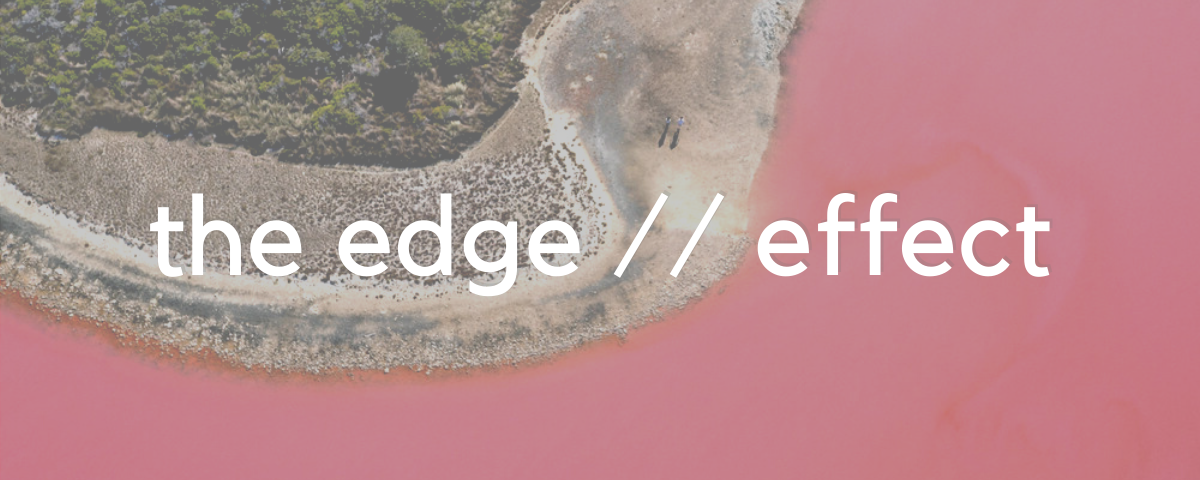Strategy
The Edge Effect: Driving Change From Where You Are

In a moment of true serendipity, I found myself ruminating over the idea of finding new ways to do good. Any good. Better yet, use what I already have or already know to truly make a difference. Now, this is nothing new for many of us. It is the classic dilemma of our time. We see something on the news or read an article on the internet about current affairs or the climate and it seems all but hopeless.
Cue the Elevating Impact Summit; shortly after finding myself wandering down this mental path, Daylight received an invitation to attend the Edge Effect event. With our curiosity immediately peaked from the name alone, Alan Robinson (Daylight’s Director of Strategy) and I set off to discover what this meant and promptly accepted the invitation. Aligning with Daylight’s core values right off the bat, the Elevating Impact Summit itself is all about social innovation, social justice, and making change. The Edge Effect is a slightly more complicated concept. While it has only one literal definition, it has seemingly endless metaphorical ones. It can be viewed simply as an ecological phenomenon, or it can be used to describe how cultures, communities, or people interact with one another. In the case of this summit, each speaker was given the space to decide what it means to them within the context of their line of work.
Learning from the Misfits
For a moment, let’s view the Edge Effect as the act of operating at the boundaries of society and social norms. During one of the most unique keynotes I have ever had the privilege of seeing, Alexa Clay encourages a new way of thinking about business, entrepreneurship, and economies. After observing the gangsters, hackers, drug dealers, and pirates of the world, Alexa found that not only have these people created their own thriving innovative ecosystems and economies (albeit, on the wrong side of the law), there are many lessons to be learned from them.
While I won’t speak too much to the details of her research (if you’d like to learn more about this topic, feel free to check out her website or her book, The Misfit Economy), a key takeaway that I think we can all get from this is that there is so much value to be found in pushing boundaries and thinking outside the box. The true innovators and changemakers of the world are not the ones that chose to simply keep doing things the way that they have always been done. They are the ones that identified a gap, disrupted the status quo, and aggressively pursued their goals. Regardless of what industry you are in, is there a change that you believe needs to be made? Is there a new perspective that you could adopt that could influence your work for the better? It is a powerful thing to question everything, and perhaps even more so, to change your mindset.
Intrapreneurship (Yes, you read that right)
In this case, let’s think of the Edge Effect as the gap between two cultures, communities, or social/business circles. How would you bridge the gap? During her inspiring talk, Maggie De Pree told the story of a man named Sam McCracken, a basketball coach and Native American of the Sioux tribe in Montana. While working in a Nike warehouse, Sam had the idea to use his role at the biggest sports company in the world to help his community battle their epidemic levels of diabetes. Sam worked together with the leaders in his community to participate in health-promoting events with the help of added incentives from Nike such as free or discounted Nike products. The success of this initiative resulted in the creating of Nike N7, a line of products inspired by and embodying the sustainability values of Native American communities across the country.
This is why Maggie De Pree founded the League of Intrapreneurs (fittingly, with the help of Alexa Clay). There are people all over the world that are asking the same questions, identifying problems, and looking for ways to make a difference. With the right support from our leaders and communities of people that share the same values, Maggie believes that we can change the world.
So What Difference Can I Actually Make?
Not sure where to start? I took the liberty of distilling this process down to a few simple steps:
- Find a cause you are passionate about and come up with a plan of small, actionable steps you can take to move the needle, even if it’s only a little.
- Identify gaps. See an opportunity for your work or your company to make a difference? Tell someone. Worst case scenario, they say no. No one is going to knock you for trying.
- Talk about it, to anyone and everyone that will listen. Who knows, maybe you’ll find people that are passionate about the same things right where you are.
The truth is you don’t have to change your life to drive change. Being a radical isn’t the only way to change the world and the more of us there are that get caught up in the same vicious loop, thinking that if they don’t make a monumental, movement-sparking, take-to-the-streets kind of difference, there is no use in even trying, the more time we waste. Small acts of good can be hugely influential and certainly make a bigger difference than if all of us collectively decided to simply not try.












